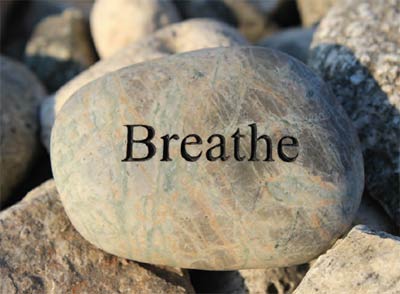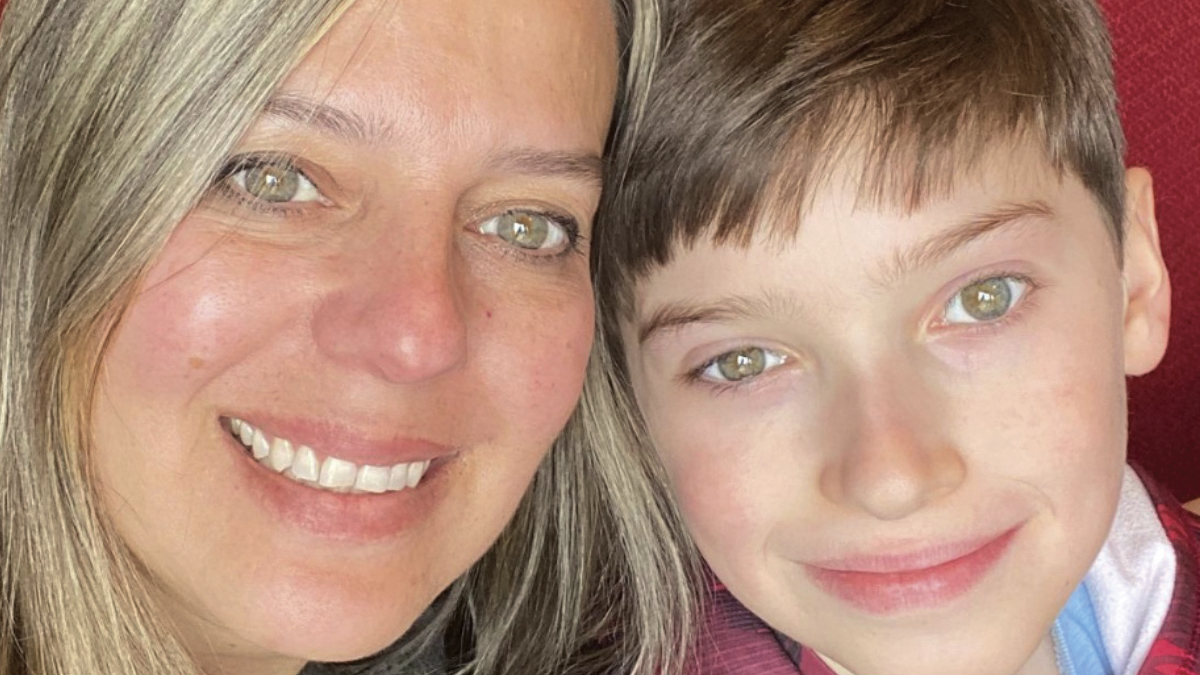In May, my husband and daughter gave me an Apple Watch for my birthday. It has all sorts of bells and whistles, including a built-in app that reminds me to breathe. Seriously? I’m running a business stacked with client needs and deadlines. I have a husband, a daughter, three dogs and volunteer responsibilities. I’m up at 5 a.m. for my daily workout. Of all the tasks in my life, I thought, I really need breathing to operate on auto-pilot.
It’s easy to hit “dismiss” and keep moving when the Apple Watch gives me a nudge to breathe. But, maybe instead, I should hit “pause” on my life and spend 60 seconds focused on some deep breathing – I just might discover the many health benefits of mindful inhaling and exhaling.
Sundar Balasubramanian, a research assistant professor at the Medical University of South Carolina, teaches a weekly 60-minute class on breathing at Holy Cow Yoga Center. A cell biology researcher, Balasubramanian also studies yoga and meditation and how yogic breathing techniques can reduce stress and improve overall health.
His recent research combines pranayama (regulation of breath) with salivary biomarkers. He discovered that yogic breathing promotes salivary secretion, and the components in saliva are important for keeping the immune system strong and reducing stress and inflammation. They also contain tumor suppressors that may prevent the formation of cancerous cells. When people are relaxed, they produce more salvia, and therefore, more of these important compounds.
So, how do you focus on breathing to benefit your health? Most people breathe 15 times every minute without giving it a second thought, Balasubramanian explained. As a result, people aren’t mindful of their breathing, so it tends to be shallow. A good way to slow down your breathing to 10 or fewer breaths per minute is simply by paying attention to your breathing. Focus on deeply inhaling and exhaling for at least one minute each hour. Also, by turning all your focus on your breath, your mind can’t wander to stressful thoughts and distractions.
Another breathing technique is to take a deep breath, filling the stomach and chest, and then hum through the exhale. There’s no way you can do 15 of these in one minute, so you’ve automatically slowed your breathing.
Along with being mindful of your breathing throughout the day, Balasubramanian recommends taking 10 to 15 minutes in the morning and evenings to work through breathing exercises.
“That will greatly improve your mental and physical health,” he said.
Living Stressed Out
In our stressed-out society, every breath counts. Dr. Valerie Scott, a family doctor with Roper St. Francis, said today people live in a perpetual state of stress.
Some level of stress isn’t all bad – a little stress motivates us to clean the house or get that paper written, she said. Centuries ago, stress helped humans escape the saber-toothed tiger. Today, though, the stress never stops.
She said there’s an absolute connection between stress and a number of health problems, not to mention the mental and emotional toll.
“Emotionally it can be very, very draining,” she said. “In our culture, we suffer very much from constantly living in stress.”

People are unable to handle the stress in their lives and that’s when they turn to unhealthy habits like using drugs, alcohol or overeating. As a doctor, the hard part is getting people to trade their harmful habits for better – and more healthful – coping mechanisms like exercise, meditation, yoga and getting enough sleep.
“It’s not the stress but how we approach the stress that matters,” Dr. Scott said. “When people get that kernel of truth, then they can make some headway.”
Mindfulness and meditation are shown to have a huge impact on the things that stress causes.
A Culture of Stress
Dr. Donald Hurley with First Family Medical Care in Charleston, a member office of Liberty Doctors, points to our American culture filled with stressors and a go, go, go mentality. Most Americans are horrible at dealing with stress. It’s why so many immigrants return to their homeland – our culture is just too stressful, Dr. Hurley said.
“Americans are all about innovation and change – and that is stressful,” he said.
DIGITAL STRESS
Almost two-thirds of Americans (65 percent) somewhat or strongly agree that periodically “unplugging” or taking a “digital detox” is important for their mental health. However, only 28 percent of those who say this actually report doing so. Among employed Americans who check their work email constantly on their days off, their reported overall stress level is 6.0 – based on a 10-point scale.
Source: Stress in America survey by the American Psychological Association
Having hosted exchange students and practiced medicine in 17 different countries, Dr. Hurley said he sees just how different American culture is. For example, one of life’s greatest stressors is moving, he said. The average American moves 22 times over their life while the average European moves only five times.
He sees how people tend to deal with stress – eating too much, hitting the fast food restaurants, skipping exercise and not getting enough quality sleep. All these lead to physical problems like diabetes, cardiovascular disease, gastrointestinal problems, ulcers, headaches and the list goes on.
“Not every single prescription I have is as effective as 30 minutes of walking seven days a week or seven hours of undisturbed sleep,” Dr. Hurley said.
That means at the core of Dr. Hurley’s work is figuring out why patients aren’t exercising or why they aren’t sleeping – truly getting to the root of the problem.
“In the long run, very simple interventions can have a profound effect on your health overall and protect you from stress,” he said. “Walking daily, not drinking or smoking, eating right, social activity, sleeping seven to eight hours – that little recipe works about 90 percent of the time.”
Be in the Now
Lair Torrent of Charleston Holistic Counseling in Mount Pleasant helps his patients settle their minds as a way to cope with the stress in their lives. A licensed marriage and family therapist, Torrent said relationships are deeply linked to happiness.

“We do confront a lot of stress that is the byproduct of things that go wrong in our relationships at our job, in our family, with our partner,” he said.
He takes a holistic approach to relationship stress, working with patients on a mindfulness-based approach that has its roots in Eastern psychology and Buddhist teachings.
“Mindfulness and meditation are shown to have a huge impact on the things that stress causes,” Torrent said. “We can have an old conversation about stress – that it causes insomnia, high blood pressure – but that’s the tip of the iceberg. We need to talk about how ‘dis-ease’ in the nervous system causes disease at a cellular level.”
Most people spend 70 percent of their waking life in some form of a stress response, Torrent said. It’s become an acceptable part of life – and yet the consequences can be dire.
Unfortunately, most people simply want to mask the symptoms with a pill, which leads them to take another pill and another pill – a regimen that’s just not sustainable, Torrent said.
“You have to deal with stress on a physical, mental and emotional level,” he said.
On the physical plane, that means being active. Movement floods the body with serotonin and endorphins to fight off those stress hormones.
For good mental health, Torrent turns to mindfulness-based approaches. He recommends meditation – even short bursts of eight to 10 minutes each day.
“What does mindfulness do? It allows you to be in the moment,” he said. “We are doing that because it keeps us from lamenting the past and fearing the future. If you stay in the moment, you’re not creating those stress hormones.”
If you’re walking the dog, focus on walking the dog and not the email you need to send, he said. If you’re playing with your kids, focus on playing with the kids and not that conversation you need to have with a client tomorrow.
TOP CAUSES OF STRESS IN THE UNITED STATES
1. JOB PRESSURE
2. MONEY
3. HEALTH
4. RELATIONSHIPS
5. POOR NUTRITION
6. MEDIA OVERLOAD
7. SLEEP DEPRIVATIONSource: American Psychological Association, American Institute of Stress (2014)
Torrent recommends starting a meditation routine by setting aside three minutes three times a day to feel your body, get in touch with your breathing and pay attention to your thoughts and feelings. Don’t let your thoughts take you down the road of grocery lists and carpools.
Humans are the only animals that can create stress hormones in their body simply by thinking about stressful situations, Torrent said. That’s why it’s so important to pay attention to your thoughts and let those stressful thoughts go.
Emotional health is often tied to the relationships in our lives, especially marriage or romantic relationships.
“It’s important to work on the relationships in your life,” Torrent said. “When people talk about their life not working, it often means their marriage is going south and that’s a huge stressor.”
Being in the now, meditation, daily exercise and other healthy habits all take a commitment. Getting people to make those changes isn’t always easy, Torrent said.
“Massive change usually comes from the threat or actuality of massive loss,” he said. “When someone is really in trouble, they’ll start doing things. That’s unfortunate because, by that time, things are probably pretty far down the road.”
In his practice and online courses, Torrent gives daily homework centered around habits like mindfulness to keep people on track: “We’re talking about changing habits, and, in order to do that, you have to do these things daily.”
Visit Balasubramanian’s website at www.pranascience.com for a detailed video of breathing techniques or to order a copy of his book, “Pranascience: Decoding Yoga Breathing.”
By Holly Fisher







